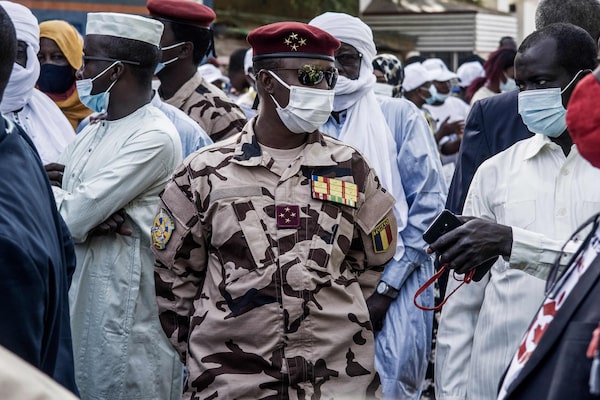
Four Star General and head of the Republican Guard in Chad, Mahamat Idriss Déby Itno (C), 37, son of Chadian President Idriss Deby Itno is seen at a polling station in N'djamena on April 11, 2021.MARCO LONGARI/AFP/Getty Images
Chad’s long-ruling president Idriss Déby Itno has been killed in fighting with heavily armed Libyan-based rebels, raising doubts about the stability of a key Western ally in the battle against terrorism and insurgency in West Africa.
Mr. Déby, in power for 30 years after leading a coup in 1990, had been proclaimed the winner of Chad’s latest national election on Monday with nearly 80 per cent of the vote, giving him a sixth term in office, after an election campaign in which demonstrations were banned or broken up.
But instead of staying in the capital to give a victory speech, he reportedly went to the front lines of the battle against the rebels, where he was killed in unclear circumstances on the weekend.
Chad’s army announced that the government and parliament had been dissolved. A curfew was imposed and borders were closed.
The army declared the formation of a military council to rule the country for an 18-month transitional period, with 15 generals appointed as members of the council, headed by the late president’s 37-year-old son Mahamat Idriss Déby Itno, a four-star general who leads the elite presidential guard.
This means that the military is ignoring the provisions of Chad’s constitution, which requires the head of the National Assembly to take over if the president is incapacitated or the presidency is vacated. The constitution also requires elections within 90 days, but the military made no mention of the timing of elections.
While the military claimed to have halted the rebel advance and killed hundreds of insurgent fighters, analysts said the rebels had moved rapidly to within 150 kilometres of the capital, N’Djamena, and still remained a threat to the regime. Several countries, including the United States and Britain, had advised their citizens to leave the country because of the rebel threat.
Mr. Déby, whose military was one of the best-armed and most disciplined in the region, had been a crucial ally of the campaign against jihadists in the Sahel region of West Africa, often with strong support from France and the United States.
Nigerian President Muhammadu Buhari, facing a prolonged insurgency from radical Islamist militias in northern Nigeria, was among the first to voice his worries on Tuesday evening.
“The death of President Déby will surely create a big vacuum in the efforts to jointly confront the Boko Haram terrorists and the Islamic State West Africa Province,” the Nigerian leader said in a tweet.
“I’m deeply shocked and devastated by the sudden death of President Idriss Déby on the battlefront,” he said. “The late President played a very active role in our regional joint collaboration in the military campaign against Boko Haram terrorists…. We must now strive to mobilize even greater collaboration to defeat the terrorists.”
Chad itself could face “uncertainty and turmoil” after Mr. Déby’s death, according to the Center for Strategic and International Studies, a U.S.-based think tank.
“While Déby’s son is ostensibly in charge, his continued rule is far from certain,” said Judd Devermont, director of the centre’s Africa program, in a commentary on Tuesday.
He noted the new leader’s youthful age and the significant number of internal and external opponents that he will need to navigate.
Dan Eizenga, a researcher at the Africa Center for Strategic Studies in Washington, expressed similar concerns about Chad’s future. “We’re faced with what is likely to be prolonged instability in Chad,” he told a seminar organized by the Sahel Research Group at the University of Florida on Tuesday.
“It’s going to be a very contentious moment for Chadian politics. The chances of instability or violent conflict are quite high now.”
Just two months ago, Chad had announced the deployment of about 1,000 troops to help battle Islamist rebels near the adjoining borders of Niger, Burkina Faso and Mali. But its regional operations are now in doubt.
“Chad’s interim military council probably will struggle to sustain its critical role in regional counter-terrorism operations,” Mr. Devermont said.
He said the Chadian military is overstretched in West Africa and had already been obliged to bring troops back to the country to fight the latest rebel offensive. “It is likely that this trend will intensify under the new interim government, which may pause further deployments to focus on regime security.”
It was unclear whether any international leaders will object to the unconstitutional transfer of power to Mr. Déby’s son. The African Union, which has a policy of refusing to recognize leaders who are installed in coups, made no comment on the appointment of the military council.
The United States, in a statement by State Department spokesman Ned Price, said it supported “a peaceful transition of power in accordance with the Chadian constitution” but said nothing about the military council.
Human Rights Watch noted that Chad’s international allies had propped up Mr. Déby’s government for many years, while ignoring his repressive tactics at home, in exchange for its counterterrorism operations in West Africa.
It called on the new transitional council to reverse Chad’s downward trajectory on human rights and to move promptly to a civilian government and free elections.
Our Morning Update and Evening Update newsletters are written by Globe editors, giving you a concise summary of the day’s most important headlines. Sign up today.
 Geoffrey York
Geoffrey York